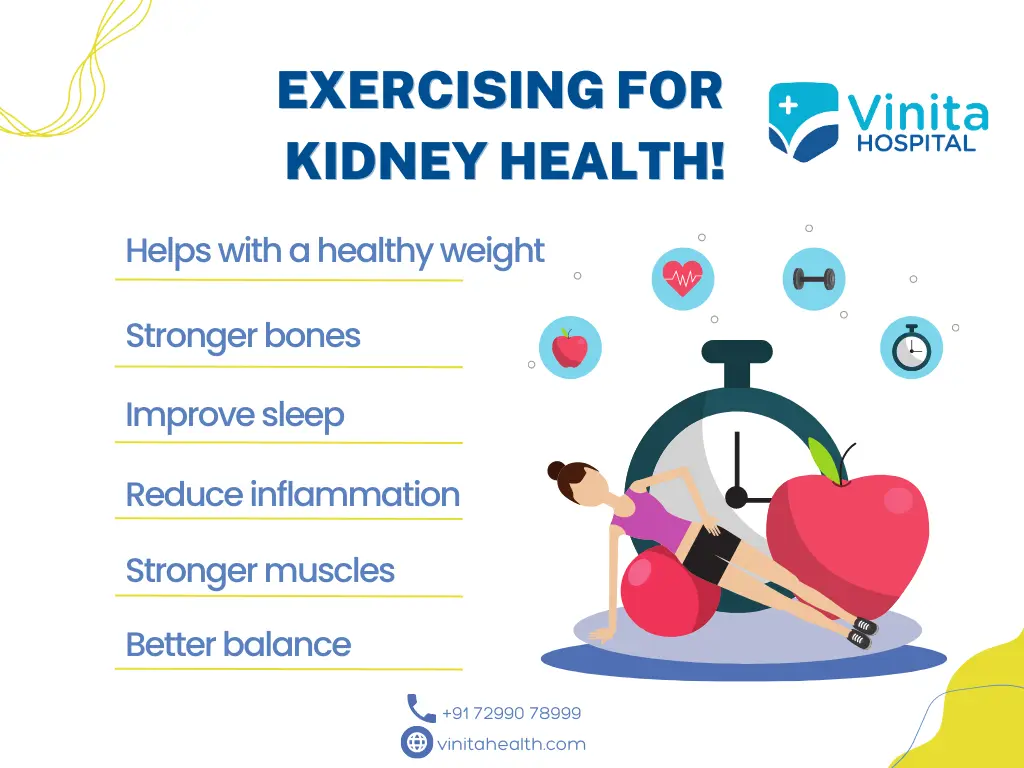Kidney stones are solid masses that are formed inside the kidney when any waste materials are collected due to the insufficiency of fluids in the body. Best exercise for kidney stones is formed in the kidney but they pass anywhere in the urinary tract. A few factors are considered to have kidney stones like Low fluid intake, a high protein diet, foods rich in oxalate, excess salt, excess body weight, etc.
Along with the medication, good foods and exercises can heal you from a kidney stone. The best exercise for kidney stones can only heal you from kidney issues.
Does Exercise Help with Kidney Stones?
Exercise plays an important role in the functioning of the human body properly. Doing the regular best exercise for kidney stones like a 30-minute walk, jogging a little, or doing a little cardio can heal your kidney stone problems. Regular exercise can help your organ to function properly. When you have such issues as kidney stone problems then doing exercise can be very effective.
The best exercise for kidney stones like jogging, walking, and doing cardio exercises can improve your kidney quality and ensure you get rid of kidney-related ailments.
Doing mild exercise is also the best exercise for kidney stones it can reduce the chances of creating kidney stones.

How Effective is Exercising for Kidney Stones?
The best exercise for kidney stones can keep your kidney fit and fine along with your whole body. Doing normal walking, jogging, and cycling are a few exercises where you can get rid of stone-related ailments problems. Along with doing this normal exercise, you can avoid obesity, cholesterol, and blood pressure, which are also the main factors for kidney stones.
When you exercise regularly, you can maintain your salt, calcium, and minerals levels in the body. That will help you not to accumulate excess salt, and minerals to be deposited in your body which is the main reason to form solid masses like stones in your kidney.
On the other hand, moderate exercise can improve kidney function. Regular doing best exercise for kidney stones can increase blood circulation to the kidneys and keep them kidney healthy. A low-intensity workout is the best exercise to pass a kidney stone.
Doing low-intensity workouts like walking, jogging, and cycling can help to pass the stone easily from your urinary tract.
Aquatic exercises and aerobics are also the best exercise for kidney stones where you can prevent further enlargement of the stone inside your body. Mild exercises like jogging and skipping can also reduce the chances of salt and minerals depositing in your body, which avoids forming solid masses like stone.
Yoga Best Exercise for Kidney Stones
Apart from other workouts, yoga is also the best for removing your kidney stone. Yoga asanas like Garudasana, Ushtrasana, Bhujangasana, etc. are very much beneficial when you have issues like kidney-related ailments. It heals the pain and gives relief from kidney stones.
Exercising can also avoid chronic kidney disease (CKD) by keeping you away from factors like blood pressure, heart ailments, cholesterol, obesity, type 2 diabetes, etc.
Other Healthy Changes that Get rid of Kidney Stones
Along with exercises, you need to hydrate yourself first! Consume lots of fluids to keep your body hydrated. Doing exercise and keeping yourself hydrated is important dehydration may lead to symptoms of kidney stones. Drinking lots of water before, after, and during your whole workout is good.
You can take certain drinks like cranberry juice and lemonade which is very beneficial to keep you hydrated all day and also break down your stones. There is a need for some dietary changes like intake of less salt, minerals, and oxalate-rich foods. Always try to avoid preserved and processed foods that can put extra pressure on the kidneys.
Seeking Medical Help for Kidney Stones
When dealing with kidney stones, it’s crucial to seek medical help. While the Best Exercise for Kidney Stones like walking or swimming can aid in passing stones, they are not a substitute for professional medical care. Kidney stones can lead to severe complications if not treated properly, such as urinary tract infections or kidney damage. Consulting a healthcare provider ensures that you receive the appropriate treatment and guidance, including:
- Accurate diagnosis through imaging tests
- Prescription medications to manage pain or dissolve stones
- Expert advice on dietary changes to prevent future stones
Remember, exercise alone cannot clear kidney stones. Combining the Best Exercise for Kidney Stones with proper medical treatment ensures a safer and more effective recovery process.
Conclusion
If you have kidney problem issues then overview the blog in detail what are the best exercises to improve your kidney quality and what food to eat and not! Apart from that change your lifestyle and add yoga as your fitness mantra to avoid kidney-related ailments. Be healthy and stay fit and fine!
Read also Best Neurologist in Chennai.





